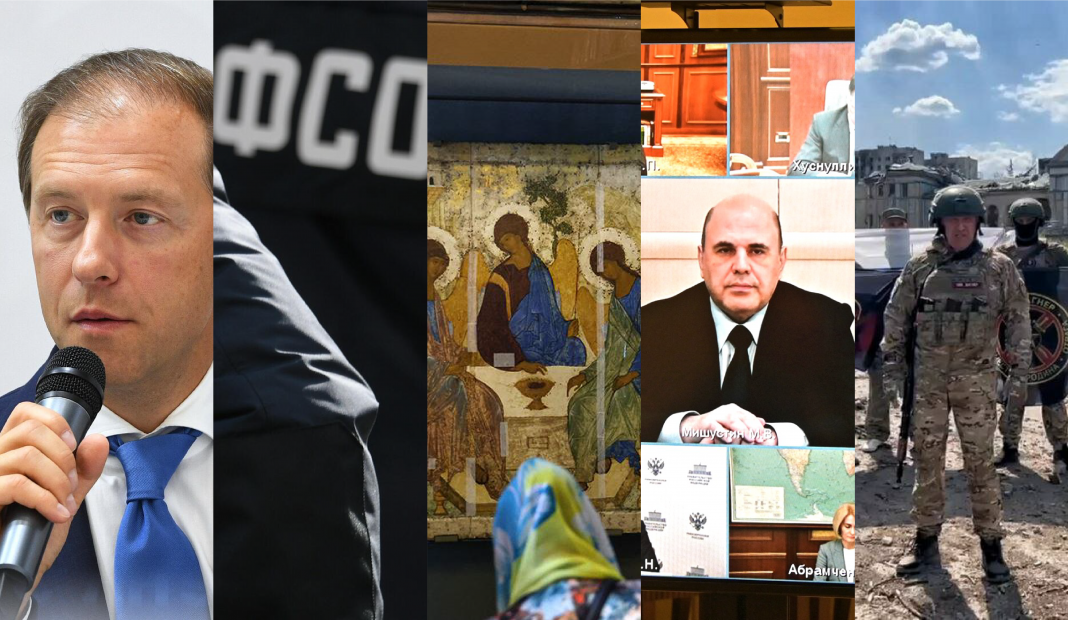This report describes the key events that significantly impacted Russia’s political, economic and social processes.
Based on the results of the past week, the following trends can be summarised:
- In Russia, the preparations for the presidential elections are getting increasingly noticeably active every week. From the point of view of technology, as Ascolta has repeatedly written, the Kremlin continues the controlled popularisation of Yevgeny Prigozhin as the leader of the “party of war”. After the announcement of the complete capture of Bakhmut, we should expect an even more noticeable increase in Prigozhin’s political ambitions.
- In the face of growing regional competition, Russia is betting on developing logistics routes. The successful implementation of such projects will allow Moscow not only to strengthen logistics at the regional level but also to strengthen ties with its closest neighbours, thereby protecting itself from possible confrontations. In general, the trend towards active redistribution and the creation of new logistics routes in Asia and the Middle East is worth noting, designed to optimise the existing supply chains significantly. Therefore, Russia remains an essential link between the West and the East.
- In Moscow, there is a fundamental change in tactics towards Ukraine. With the active popularisation of Yevgeny Prigozhin as the leader of the “party of war”, an attempt is being made to distance Putin from the military agenda. Instead, he focuses more and more on domestic political issues and demonstrates his neutrality in the conflict between Prigozhin and the military leadership of the Russian Federation. At the same time, questions are increasingly being raised at the geopolitical level about the need to find a formula for peace for the speedy cessation of hostilities. In this case, Putin’s behaviour should be regarded as a gradual preparation for the cessation of hostilities. Apparently, from June, we will be able to observe fundamental changes both on the battlefield and in the political rhetoric of all parties.
This digest discusses the following issues that were most relevant for Russia from 15 to 21 May:
- Statement by Yevgeny Prigozhin about the complete capture of Bakhmut;
- The ceremony of signing an intergovernmental agreement between Russia and Iran on cooperation in the creation of the Rasht-Astara railway;
- Putin’s meeting with members of the Government;
- Extension of the Black Sea Grain Agreement;
- Visit of Sergei Shoigu to the temporarily occupied Mariupol;
- Interview of Denis Manturov with the Russian news agency TASS;
- Signing by Putin of a decree amending the Regulations on the Federal Security Service;
- Transfer of the icon “Holy Trinity” to the Russian Orthodox Church (ROC).
This Content Is Only For Subscribers
- STATEMENT BY YEVGENY PRIGOZHIN ABOUT THE COMPLETE CAPTURE OF BAKHMUT
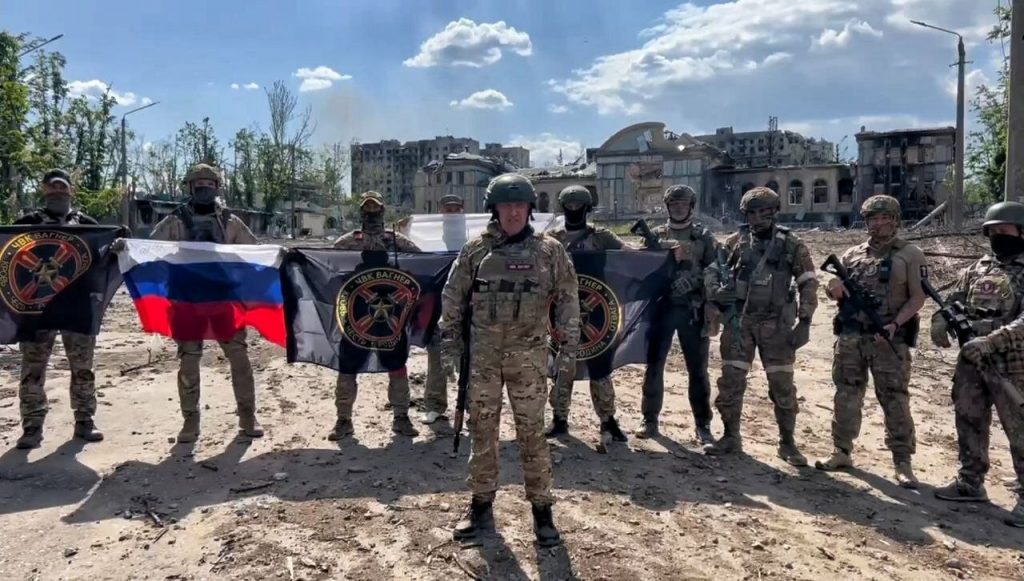
On Saturday, May 20, several Telegram channels associated with the curator of Wagner PMC Yevgeny Prigozhin, published information about the complete capture of Bakhmut, the battles for which lasted 224 days. By lunchtime, Prigozhin himself confirmed the relevant information by posting a video message against the backdrop of the destroyed buildings of the city. It is noteworthy that in the appeal itself, Prigozhin did not so much talk about the capture of the town as he criticised the military leadership of the Russian Federation. He also once again announced the plans of the Wagner PMC to transfer the positions of the Russian Armed Forces and then leave Bakhmut.
Key theses:
- “Today, at noon, at 12 o’clock, Bakhmut was completely taken.”
- “The Bakhmut meat grinder began on October 8, 2022, to allow the battered Russian army to recover. For 224 days, the guys stormed this city. But, unfortunately, there were only Wagner PMCs here. As Konashenkov said, there were not Airborne Forces and anyone else who could help us.
- “PMC” Wagner “, generals, former law enforcement officers, the FSB and former prisoners of repeat offenders acted here as one well-coordinated team, one army.”
- “Thanks to General Surovikin and General Mizintsev, who allowed us to carry out this difficult operation. And thanks to Vladimir Vladimirovich Putin for giving us this opportunity and the high honour to defend our homeland.”
- “We fought not only with the Armed Forces of Ukraine in Bakhmut. We fought the Russian bureaucracy, which put a spoke in our wheels. This is especially true of near-military bureaucrats. Their names are partially known; they are Shoigu and Gerasimov, who turned the war into their entertainment and decided that their whims in the war would be fulfilled. But because of their whims, five times more guys died than they should have died.
- “We have prepared lists of those who helped us and those who actively opposed us, actually supporting the enemy in this matter.”
- “Today we took Bakhmut. From the 25th, we will withdraw our units for rest and retraining. We fought for 427 days. We completely took the whole city, from house to house, so that no one could pedantically reproach us that at least some section was not taken. Until May 25, we will completely inspect it, create the necessary defence lines, hand it over to the military, and go to field camps.”
- “[To Zelensky] Vladimir Aleksandrovich, without sarcasm, your guys fought bravely, fought well. If you follow this path, you can become the second army in the world, certainly after the most powerful army in the world – Wagner PMC. So today, when you see Biden, kiss the top of his head and say hello to him. And shake hands with Syrsky and Zaluzhny if he is in good health.
Outcomes and outlook:
Prigozhin, as Ascolta noted earlier, continues to act more and more in the role of a politician, not a military one. Each of his messages is rather a political manifesto and the creation of a springboard for a new political force. Or for its positioning as a politician, who is the quintessence of the “party of war.” Interestingly, Prigozhin continues to try to contrast the “good” generals (Surovikin, Mizintsev, who joined Wagner) with the “bad” ones (Shoigu, Gerasimov). In this regard, Prigozhin plays on the presence of opposing groups within the Russian Armed Forces.
An important point: Prigogine plays “military nobility” and recognises the bravery of his enemies. This is not characteristic of the new type of war but was widespread until the twentieth century. Thus, Prigogine is trying to demonstrate the “old regime” and the revival of military traditions.
Notably, the very capture of Bakhmut, which is not confirmed by the Ukrainian side, was timed to coincide with the G7 summit, which was also reflected in Prigozhin’s address. This move was designed to demonstrate the Russian army’s strength and to tell the West that the impending counteroffensive could face serious resistance.
- THE CEREMONY OF SIGNING AN INTERGOVERNMENTAL AGREEMENT BETWEEN RUSSIA AND IRAN ON COOPERATION IN THE CREATION OF THE RASHT-ASTARA RAILWAY
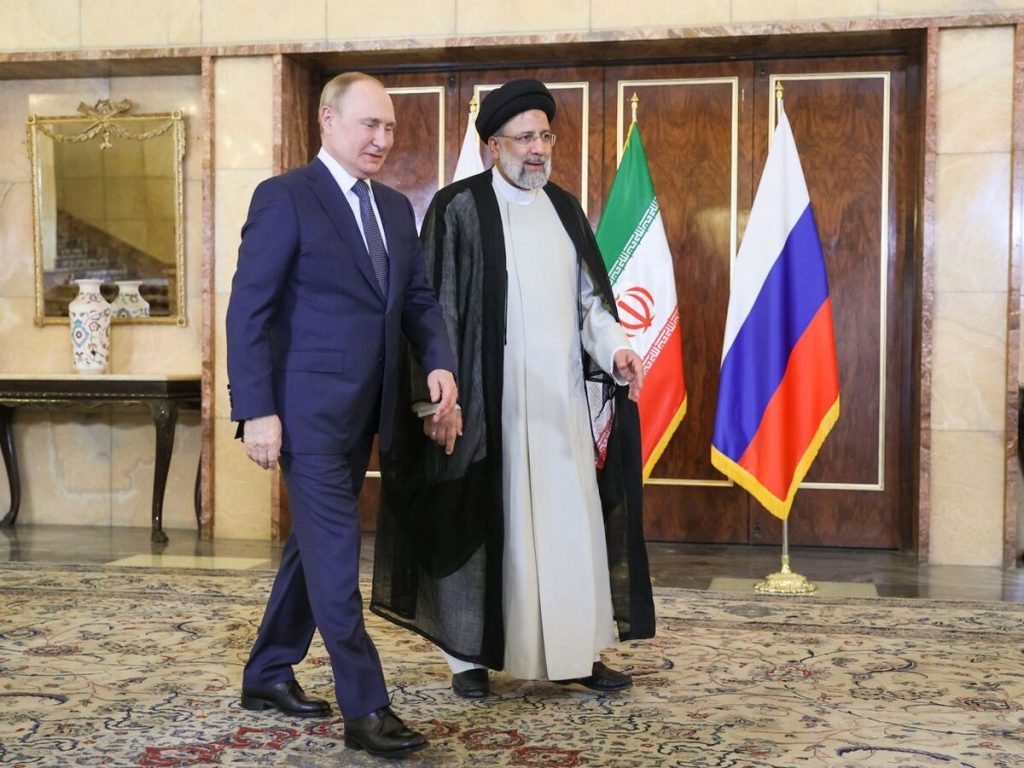
On Wednesday, May 17, the presidents of Russia and Iran, via videoconference, took part in the signing ceremony of the Agreement between the governments of the two states on cooperation in financing the design, construction and supply of goods and services for the creation of the Rasht-Astara railway in Iran for the development of transportation along international transport corridor “North-South”. The leaders of the two states also addressed the participants of the ceremony.
Key theses:
- Raisi: “I must express my joy that an agreement on creating the Rasht-Astara railway was reached between Iran and Russia.”
- Raisi: “I think this corridor will work in the interests of all regional countries and states. This corridor and all the countries connected to this project – both in the western part and in the eastern part – in fact, is a symbol of friendship of a multifaceted nature between our countries. This project will give a great impetus to developing comprehensive cooperation.”
- Raisi: “I consider it my historical duty to our people and, within the framework of neighbourly cooperation, to use the potential that exists in our region, the infrastructure that should be between our countries so that we have the opportunity to carry out our multifaceted projects.”
- Raisi: “There is great potential in the Islamic Republic of Iran, despite the collective West wanting to bypass Iranian territory on transit issues.”
- Raisi: “I would like to emphasise again that this project has three branches. The Russian Federation, Kazakhstan, Turkmenistan and Iran are the eastern branch. Through joint efforts, this route is already operating; it has been used in pilot mode several times. The central branch, through the Caspian Sea, has great potential. We must strengthen our ports’ capabilities and the ports’ capacity. With the participation of Russian companies, this also works and works. However, the western branch is still missing, and the part [of the railway] between Rasht and Astara is missing. By implementing this agreement, we will be able to fill this gap so that we have three active branches through which we can transport goods and promote our projects.”
- Raisi: “There is another project between Iran, Pakistan and Turkey. We must strengthen the rail infrastructure between Iran and Iraq. All efforts are made along this path. Or [the path] from the port of Chabahar in the Persian Gulf to the Caspian Sea, then through the Russian Federation’s territory and then along the European route. These are all possible options for cooperation with such a large country as the Russian Federation. I think all these projects will be in our countries’ trade and economic interests. I am sure about that”.
- Putin: “We talked a lot about the importance of building this through transport artery, which is designed to connect Russian ports in the Baltic and northern seas with Iranian ports on the coast of the Persian Gulf and the Indian Ocean.”
- Putin: “A 162-kilometre railway line will be built between the Iranian cities of Rasht and Astara. It would seem that this is a small section. Still, its commissioning will allow establishing a direct and uninterrupted, or, in other words, experts say, seamless railway communication along the entire length of the North-South route.”
- Putin: “I would like to emphasise that the unique North-South transport artery, of which the Rasht-Astara railway will become a part, will help to diversify global traffic flows significantly. Transportation along the new corridor will have significant competitive advantages. In particular, the delivery of goods from St. Petersburg to Mumbai will take about ten days. For comparison, I’ll say that the travel time along traditional trade routes is up to 30-45 days.”
- Putin: “Implementation of the Rasht-Astara project is only the beginning (I agree with the President of Iran here) of work on a systematic increase in the capacity of the railway routes of the North-South transport corridor.”
- Putin: “Interaction in the context of the creation of this corridor, which we are talking about today, is carried out in close partnership with Azerbaijan. And we look forward to the soonest completion of the preparation in a trilateral format, with the participation of the Azerbaijani side, of an agreement on cooperation in developing railway infrastructure and freight traffic along the North-South route.”
Outcomes and outlook:
Developing economic relations with the “global South” is of great importance for Russia. And not only for Russia. Today, China, Russia, India, Iran and the countries of Central Asia are creating a unified communication and logistics network that makes it possible to transport goods within the Eurasian space, trying to minimise the risks of a “big split”. Also, creating this network should weaken the consequences of Western sanctions – both for Russia and other countries. Moreover, taking into account the signed agreements between China and the countries of Central Asia, the Rasht-Astara project can become an additional branch of cargo traffic in conditions when the northern branch of the Great Silk Road is blocked.
Russia is trying to strengthen its position in partnership with China in every possible way. The development of transport routes on its own territory and neighbouring states’ territory will undoubtedly be an important element for further interaction and distribution of resources throughout the region.
It is noteworthy that in his speech, Putin mentioned the trade route from St. Petersburg to Mumbai, thereby signalling that an attempt by NATO member states to monopolise the Baltic Sea would inevitably clash with the interests of China and India. Thus, Russia is trying to secure this direction.
- PUTIN’S MEETING WITH MEMBERS OF THE GOVERNMENT
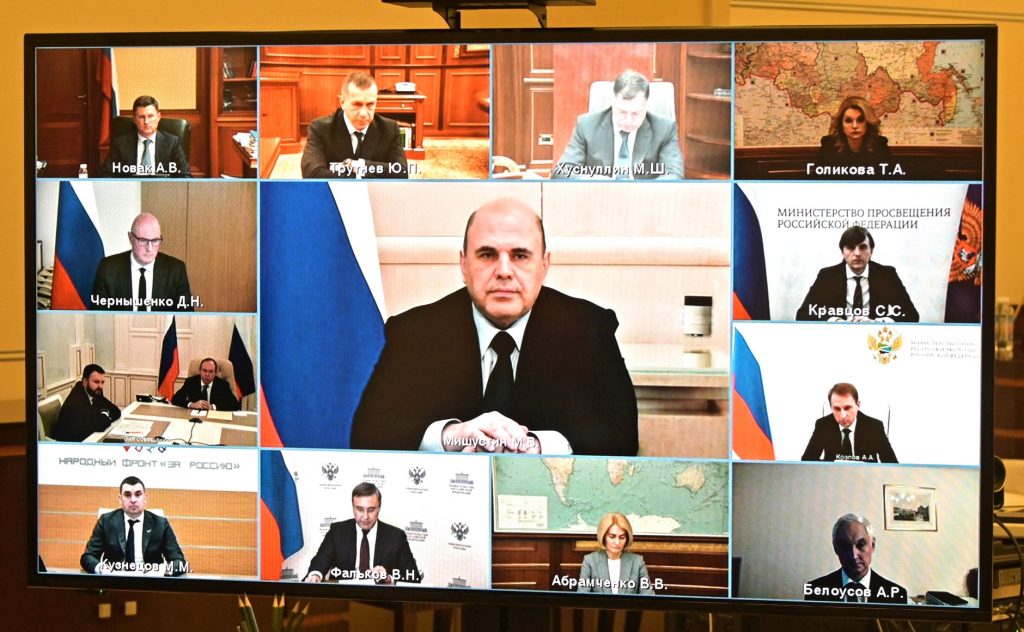
On Wednesday, May 17, Vladimir Putin held a meeting via videoconference with a member of the Russian government. Officially, the main topic of the meeting was the issue of increasing the availability of goods and services in the new subjects of the Federation [temporarily occupied territories of Ukraine]. At the same time, the president paid special attention to the situation with forest fires, floods, and several other issues.
Key theses:
- Minister for Civil Defense, Emergencies and Disaster Relief Alexander Kurenkov delivered a report on the situation with forest fires and floods:
- “To date, the fire season has begun in almost all regions of the Russian Federation. Since April 25, the most challenging situation has been developing on the territory of the Urals Federal District. In the Sverdlovsk, Kurgan, and Tyumen regions, more than six thousand buildings were damaged due to the fire spread in 25 settlements, including 802 residential buildings.
- “I would like to note that compared to the previous year, the number of fires in this region has increased one and a half times, and the area covered by fire has increased 16 times.”
- Also, the Governor of the Kurgan Region, Vadim Shumkov, the Governor of the Sverdlovsk Region, Vladimir Kuyvashev and the Governor of the Tyumen Region, Alexander Moor, made presentations on this issue.
- Deputy Prime Minister Victoria Abramenko made a presentation on the reform of the waste management industry.
- “Recycling means giving waste a second life, extracting useful fractions, and putting them into circulation within the circular economy framework.”
- “Our goal is to halve landfill-related waste by 2030.”
- “Last year, the estimated payment of citizens for the treatment of MSW amounted to about 175 billion rubles, and the amount of the environmental fee credited to the budget received from businesses does not exceed 4 billion rubles.”
- First. We have shifted the responsibility for recycling from product manufacturers to packaging manufacturers. Thus, we will free producers of food and other goods from having to deal with recycling or pay eco-fee for packaging materials.”
- Second. The obligation to dispose of the entire released packaging volume is established by a direct rule of law from January 01, 2027, so manufacturers can prepare.”
- “The third change concerns the oversight of disposal and the improvement of the administration system.”
- “And the fourth. We are introducing incentives for using recyclable and environmentally friendly materials due to the differentiation of environmental fee rates.”
- The Minister of the Russian Federation for the Development of the Far East and the Arctic, Alexei Chekunkov, made a report on the implementation of the project for the development of the Northern Sea Route until 2035.
- “Cargo traffic along the NSR has grown from four million tons in 2014 to 34 million tons in 2022, five times the record of the Soviet era. The Northern Sea Route has already become a key transport corridor for exporting oil, liquefied natural gas, mineral fertilisers, metals and other high value-added products to world markets.”
- Leading Arctic companies – Novatek, Vostok Oil, Gazprom Neft, Norilsk Nickel, Baimskaya, Severnaya Zvezda – signed up for target cargo volumes. Following the agreements, only these companies must supply at least 30 million tons to the NSR this year, at least 71 million tons in 2024, and more than 190 million tons in 2030.”
- “The NSR development plan will create all the necessary infrastructure to transport these goods, forming a new Arctic economy. The first is the formation of a cargo base. The second is the creation of land transport infrastructure. The third is the development of the fleet. Fourth, ensure the safety of navigation along the NSR. And the fifth point of the plan is the centralisation of the management and development of navigation along the NSR.”
- “The volume of investments in implementing the plan until 2035 will amount to 1.8 trillion rubles. Of these, 620 billion are federal budget funds, 407 billion are extra-budgetary sources, and 764 billion are additional needs that responsible executors must work out in a timely manner as part of the budget process.”
- Alexei Likhachev, General Director of Rosatom, also made a presentation on Arctic issues:
- “Despite the sanctions, including restrictions related to equipment supply, none of the major projects in the Arctic has stopped implementing their plans. Together with NOVATEK, Norilsk Nickel, Rosneft and other companies, we continue to implement large-scale projects important for the Russian economy and have a key impact on global markets.”
- “Last year, we completed the construction of a federally owned facility, the Utrenny terminal, which is necessary for the further development of the Arctic LNG-2 project.”
- “The dynamic development of the Northern Sea Route raises the issue of Arctic shipbuilding. Currently, 30 relevant vessels are in operation, and 33 more vessels are under construction. In addition, the construction of four floating nuclear power plants continues. And I want to note that interest in floating boats in Russia and the world is constantly growing.”
- “Not only Russian companies are showing interest in the Northern Sea Route, but also the countries of BRICS and the Middle East. In this regard, we are working on the participation of partners from friendly countries in transit along the NSR and infrastructure development.”
- Deputy Prime Minister – Minister of Industry and Trade Denis Manturov made a report on the situation in the industrial sectors of Russia:
- “As far as metallurgy is concerned, we are practically reaching last year’s figures; that is, the utilisation and growth indicators are almost 100 per cent.”
- “In terms of electronics, growth is already over 10 per cent.”
- “As for oil refining, in general, we expect this year for the manufacturing industry to reach the figure, one can already say, plus two per cent. But of course, that is very careful, but we can already say about plus two per cent in general for processing.
- Minister of Science and Higher Education Valeriy Falkov delivered a report on the situation in the educational sphere:
- “626,278 state-funded places have been established for admission this year. The vast majority of 11th-grade graduates have the opportunity to enter a university on a budgetary basis.”
- “This year, the largest number of budget places were allocated to the field of education – engineering, technology and technical sciences – 246,204 places.”
- “Among the areas with the largest growth we have – computer science and computer technology, information security, mechanical engineering.”
Outcomes and outlook:
The Russian leadership makes it clear in every possible way that the Russian economy, despite the war and sanctions, is operating normally. At government meetings, strategic projects are considered (everything connected with the Northern Sea Route is true and of paramount importance for Russia). After such news, most Russians think, “Everything is fine with us.” The war with Ukraine is somewhere locally, but everything is generally stable. Moreover, closer to the presidential elections, Putin is increasingly distancing himself from the war.
At the same time, its work in the domestic direction is intensifying. As Ascolta wrote earlier, in recent weeks, Putin has maximised the number of meetings with the leaders of Russian regions and, at the same time, reduced to minimum participation in foreign policy processes and issues related to hostilities in Ukraine.
It should be assumed that in the Western information space, the image of Putin is specially created, which is increasingly closed in high offices and cannot demonstrate the previous activity in government.
- EXTENSION OF THE BLACK SEA GRAIN AGREEMENT
On Wednesday, May 17, it became known about the next extension of the Black Sea Grain Agreement, better known as the “grain deal”. The previous terms of the agreement were valid until May 18, and its extension remained under threat due to many conditions set by the Russian side. Therefore, it is noteworthy that all parties agreed upon the next extension without considering Russian requirements. At the same time, certain changes in the operation of the grain corridor and related processes nevertheless appeared.
Timeline:
- On Tuesday, May 16, Bloomberg, citing Turkish officials, said that the “grain deal” would be extended without considering Russian conditions.
- On Wednesday, May 17, President Turkie Erdogan officially announced that the “grain deal” was extended for another two months. He also noted that Russia would not interfere with the exit of Turkish ships from the ports of Nikolaev and Olvia.
- Minister of Infrastructure of Ukraine Oleksandr Kubrakov confirmed the continuation of the “grain deal”: “The world will continue to receive Ukrainian products thanks to the efforts of our partners in the agreement, Turkey and the UN”.
- Russian Permanent Representative to the UN Vasily Nebeznya explained the extension of the “grain deal”: “Russia still has not lost hope that the problems we raise will be resolved, and the sooner, the better.”
- On Thursday, May 18, Putin’s press secretary, Dmitry Peskov, said that negotiations to extend the “grain deal” had achieved a “relative result” in fulfilling Russian demands (the Russian Federation demanded the lifting of sanctions blocking the export of Russian food and fertilisers). He also commented on the issue of connecting Rosselkhozbank to SWIFT, saying that these processes are “equivalent to unblocking.”
- The Minister of Foreign Affairs of the Russian Federation, Sergey Lavrov, said that the next two months, for which the grain deal was extended, will be decisive regarding its future fate. The Russian Foreign Ministry also announced five main requirements that determine the further fate of the agreement:
- Reconnection of Rosselkhozbank to SWIFT;
- Supply of spare parts for agricultural machinery;
- Unblocking transport logistics and insurance;
- Resuscitation of the ammonia pipeline “Togliatti-Odessa”;
- Unfreezing the assets of Russian companies.
- On Sunday, May 21, the Ukrainian side announced that the Yuzhny port (in the Odesa region) was stopped because for three days, May 19-21, Russia did not let a single vessel into it as part of a grain deal: “In fact, Russia does not allow him to participate in the Grain Initiative, which is another gross violation of the signed agreement. Thus, Russia has found a new way to reduce the effectiveness of the “Grain Agreement” and, accordingly, reduce exports.
Outcomes and outlook:
As Ascolta predicted, the Grain Agreement has been extended. For Russia, it is an element of a big game, as it allows you to control the grain flow from Ukraine and blackmail Europe, influences the situation in Turkey, acts as a consolidating factor for several African and Asian states, and breakthrough sanctions relief.
Such projects are not so quickly abandoned – today’s “grain agreement” remains perhaps the only economic thread and channel of communication with the West, allowing Russia to partially correct the problems that arose due to the imposed sanctions.
It is noteworthy that the information about the extension of the “grain deal” was announced by Recep Erdogan. It may indicate the achievement of certain agreements on the eve of the second round of the presidential elections. Earlier, Ascolta also wrote that this “deal” is an essential financial instrument for Erdogan.
Also, soon, we should expect some progress in implementing Russian conditions. The experience of the previous extension of the “grain deal” has shown that Moscow is trying to achieve its goals without much publicity. So, despite the statement of the Ukrainian side and several Western states, the previous extension of the “deal” was signed only for 60 days, not 120. In this case, it is essential to note that on May 21, the European Union announced that they did not intend to reconnect Russian banks, including Rosselkhozbank, to the SWIFT system before the conflict’s settlement on the Ukraine territory. At the same time, Ascolta sources note that the Togliatti-Odessa ammonia pipeline may be launched shortly.
- VISIT OF SERGEI SHOIGU TO THE TEMPORARILY OCCUPIED MARIUPOL
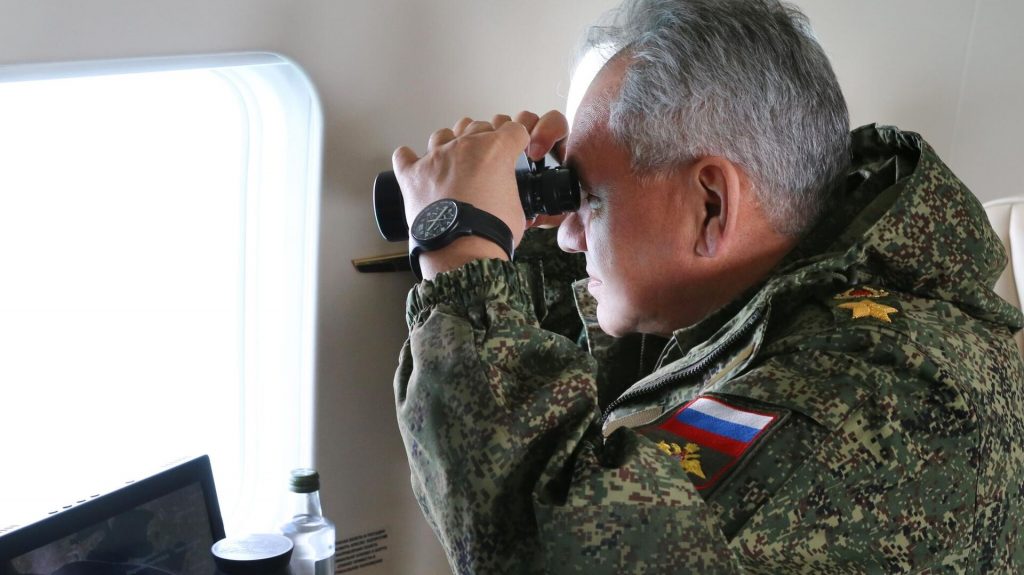
On Thursday, May 18, on the eve of the anniversary of the occupation of Mariupol, which is celebrated in Russia on May 20, there was information about a visit to the city by Russian Defense Minister Sergei Shoigu. This news was accompanied by a video report, which showed footage from helicopters and Shoigu’s meeting with the military, which took place in the bunker. However, no official confirmation has been shown. Moreover, this “visit” succumbed to active criticism from the curator of PMC “Wagner” Yevgeny Prigozhin and Telegram channels controlled by him.
Timeline:
- On Thursday, May 18, it became known that urgent exercises of Russian military personnel were being held in the temporarily occupied Mariupol.
- An audio recording appeared on the network, with a conversation allegedly Russian military, who said that by the time Shoigu arrived in Mariupol, 40 shells had been fired from a D-30 artillery mount.
- Yevgeny Prigozhin, who previously invited Shoigu to Bakhmut, said that the Minister of Defense never got to them: “No, I do not have such information. We did not see anyone from the Ministry of Defense on Bakhmut, and in principle, Bakhmut is not included in the tourist routes.
- On Friday, May 19, the Ukrainian military attacked military installations in Mariupol in the Nevsky district, which Putin visited in March.
Outcomes and outlook:
Russia continues to indicate that it does not intend to leave the occupied territories, and each visit of high-ranking officials to Mariupol, Melitopol or Donetsk becomes a mini-event for the Russian information industry. In addition, Sergei Shoigu criticised for inconsistency and even cowardice, wanted to partially shift attention from Bakhmut, where his enemy and opponent Yevgeny Prigozhin received political dividends. Shoigu’s visit to Mariupol was supposed to interrupt somewhat the informational effect that could harm him personally (Prigozhin constantly accuses Shoigu of sabotaging the supply of shells).
The visit itself was timed to coincide with the first anniversary of the occupation of Mariupol by Russian troops. Notably, this city has remained the most considerable achievement of the Russian Armed Forces in the war against Ukraine over the year. Despite this, Russian propaganda tries to show the city’s occupation as the most significant victory. Hence the attempt to quickly restore infrastructure facilities in the city.
In this case, once again, one can trace the polarisation of the Russian media, where official federal channels broadcast news in support of Shoigu and the military leadership of the Russian Federation, and telegram channels close to Prigozhin popularise the statements of the Wagner PMC curator in every possible way and highlight the corresponding “achievements”. Notably, the Ukrainian and Western media are increasingly beginning to relay the position of Prigozhin’s media group, which distorts the real situation.
- INTERVIEW OF DENIS MANTUROV WITH THE RUSSIAN NEWS AGENCY TASS
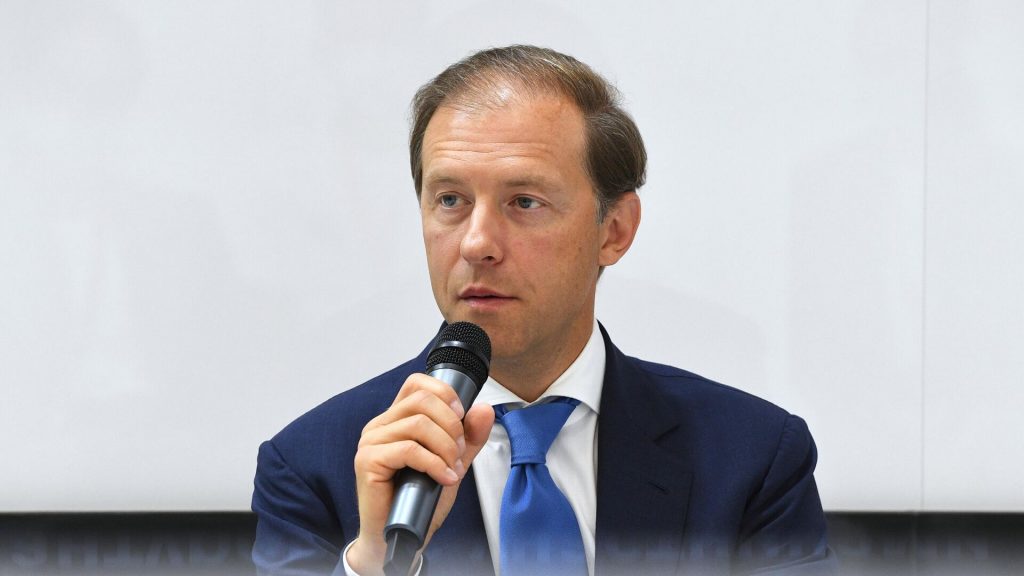
On Tuesday, May 16, the TASS news agency published an interview with Deputy Prime Minister – Minister of Industry and Trade of the Russian Federation Denis Manturov, in which he spoke about the process of restoring and integrating industrial enterprises in the temporarily occupied territories of Ukraine, as well as about the general state of the industrial complex in Russia. According to Manturov, “long-term downtime of enterprises in the territories that became part of Russia in October last year [were occupied by Russian troops] led to a decrease in the main economic indicators of these regions, but by 2026 the process of integrating the industry of these subjects will be completed.”
Key theses:
- “I can say that we have already formed a picture of the industry of the new regions [temporarily occupied territories of Ukraine], carried out an inventory and verified the potential that can be further developed. Today, we are already implementing our traditional mechanisms to support industries there. Industrial Development Funds have been created in all four regions, and all available support measures that the Ministry of Industry and Trade has today also apply to them.”
- “Today, more than one thousand industrial enterprises provide employment for 56 thousand people. Over 700 enterprises are engaged in production activities, while about 250 are idle. Last year, with our assistance, about 100 plants in the chemical, metallurgical, and machine-building industries, light industry enterprises, construction and non-metallic materials were relaunched. In addition, this year, we plan to launch a large Lugansk chemical enterprise, Severodonetsk AZOT Association.”
- “From the new regions [temporarily occupied territories of Ukraine], enterprises in other regions are already supplied with all kinds of black and non-ferrous castings, components for the production of combines, tractors, valves, mining equipment, roll products – this is already quite a large list, and with By improving logistics, it will only grow.”
- “Now we can say that the industry manages to solve all the priority tasks set to supply the Armed Forces with the necessary range of weapons, equipment and weapons. And this allows us to work ahead of the curve in several areas.”
- “Now we pay special attention to the supply and repair of tanks and lightly armoured vehicles. In general, we managed to reach a level that ensures the rhythmic supply of these products. As an example so that you can understand the scale, the volume of deliveries for the first quarter of 2023 is comparable to the total volume delivered for 2022.”
- “Thanks to the active work to fine-tune the existing and form new mechanisms for the system of support measures, by the end of 2022, it was possible to stabilise the volume of industrial production at the level of 99.4% compared to the previous year, in the manufacturing industry — at the level of 98.7%.”
Outcomes and outlook:
Manturov’s interview is dedicated to the eleventh anniversary of his tenure as Minister of Industry and Trade of the Russian Federation (he was appointed to this position on May 21, 2012). Since July last year, Manturov has become Deputy Prime Minister, who oversees issues related to the military-industrial complex. The rank of Manturov in the government is extremely high – he is considered the number one contender for the place of Mishustin in the event of the resignation of the head of the government of the Russian Federation.
Manturov is a creature of the head of Rostec, Sergei Chemezov, and a close friend of the head of the Presidential Administration, Anton Vaino. Therefore, he has a high credit of confidence from the President. In this situation, any extensive interview with Manturov is perceived as a manifesto and as an application for something more than just the position of minister and deputy prime minister. It was not without reason that this interview appeared a few days before Mikhail Mishustin visited China – depending on what Mishustin returns from Beijing with, we will see if Manturov will move to a higher chair.
Talking about the thesis of the interview itself, Manturov reported on the progress in fulfilling the tasks previously set by the president. Moreover, the public demonstration of intermediate results may indicate that Manturov’s department, and the entire Russian industry, are coping with the tasks.
- SIGNING BY PUTIN OF A DECREE AMENDING THE REGULATIONS ON THE FEDERAL SECURITY SERVICE
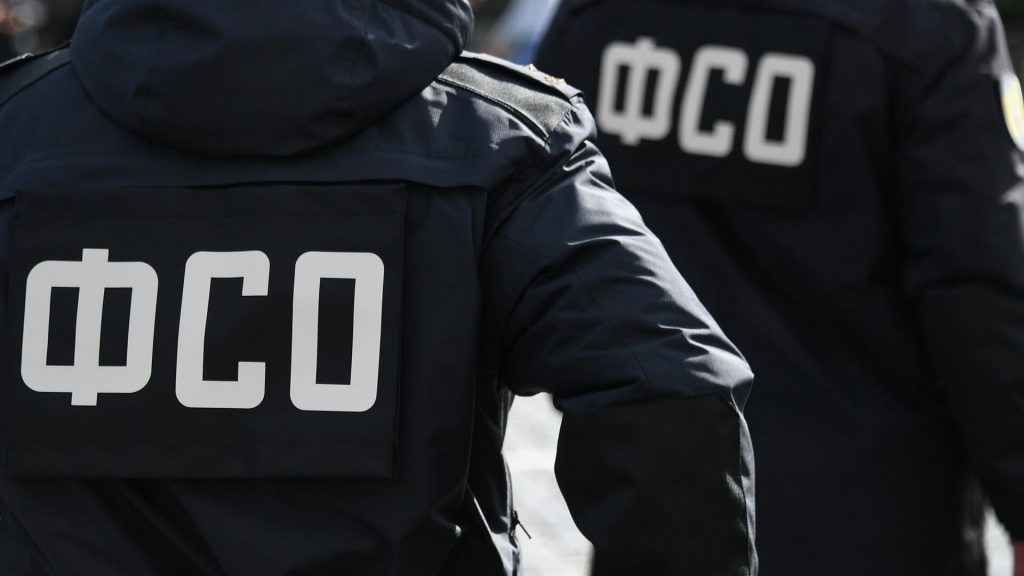
On Wednesday, May 17, Vladimir Putin signed a decree amending the regulations of the Federal Security Service. Despite the fact that this event remained practically unnoticed by the media, by such a decree, he partially expanded the powers of the FSS, which, apparently, protected himself from possible internal conspiracies and attempts to carry out coups.
Key theses:
- According to the new changes, the Federal Security Service is now responsible for state security issues within its powers. Previously, there was no such wording in the definition of the concept of service. The FSS dealt only with matters of state protection.
- Both the powers of the FSS itself and the director of this service in matters of information security have been adjusted and strengthened.
- From now on, the director of the Federal Security Service of Russia will determine, following the legislation of the Russian Federation, the conditions for the combination by military personnel of state protection bodies of military service with other paid activities.
Outcomes and outlook:
Putin’s new decree can be seen as a “decree to strengthen the role of Dmitry Kochnev.” The director of the FSS, according to the decree, becomes an equal figure – along with the director of the FSB, the head of the Foreign Intelligence Service and other influential people. The decree itself came after a recent drone attack on the Kremlin. Thus, Kochnev makes it clear that if his powers are expanded, then the incident with drones will not happen again. It seems that Putin has a new favourite, who will increasingly gain political weight shortly.
- TRANSFER OF THE ICON “HOLY TRINITY” TO THE RUSSIAN ORTHODOX CHURCH (ROC).
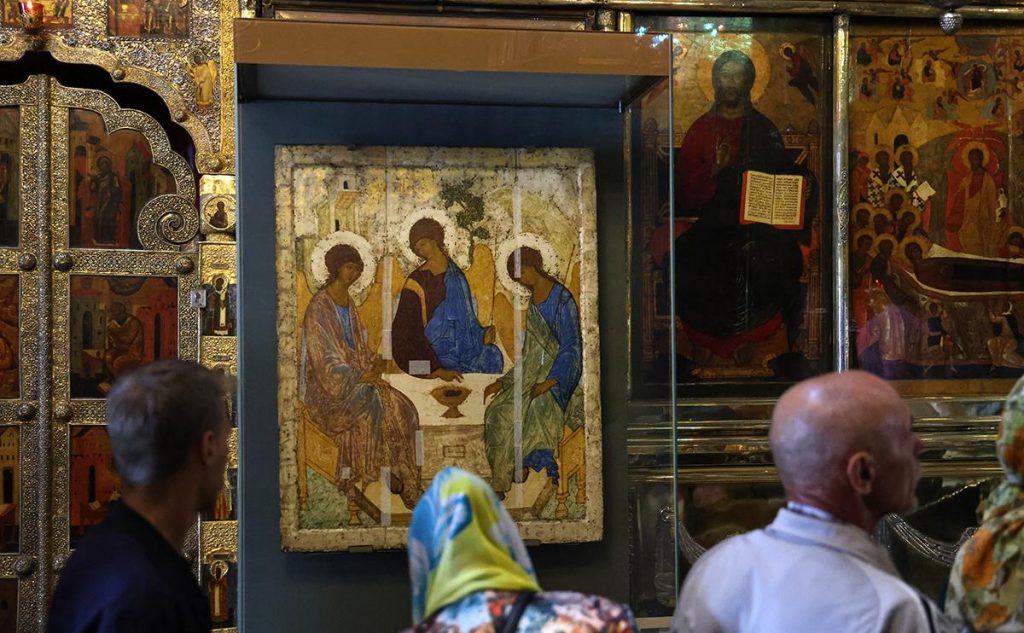
On Monday, May 15, Vladimir Putin signed a decree on the transfer of the Trinity icon by Andrei Rublev to the Russian Orthodox Church (ROC). The next day, Putin’s spokesman Dmitry Peskov confirmed that the transfer had already taken place and stated that the decision was made because of the sacredness of this icon for the Russians. According to the presidential decree, the icon will be exhibited for public worship in the Cathedral Church of Christ the Savior in Moscow during the year. After that, he will return to his historical place in the Trinity Cathedral of the Holy Trinity, Sergius Lavra. At the same time, the head of the Russian Orthodox Church, Patriarch Kirill, said that this event was historical and that the Church could only dream that the icon would be returned from the museum.
Outcomes and outlook:
Except for a certain mystical moment (Putin believes in all sorts of symbolic gestures and signs associated with the Church and also tries to become like Stalin, who at the turning point of the Second World War went into extensive contact with the Russian Orthodox Church; Putin’s entourage believes that it is thanks to this that Stalin won the war with Germany), there is a problem of personal relations between Putin and Patriarch Kirill.
Relations between them have always been far from cloudless. Since the 90s, there have been frictions between FSB director Putin and Metropolitan Kirill of Kaliningrad on issues of excise-free importation of alcohol and tobacco (previously the exclusive prerogative of the FSB, but the Church received a similar right under Yeltsin).
Putin was opposed to the election of Kirill as patriarch. In 2012, the patriarch was among those who pushed Dmitry Medvedev for a second presidential term. The return of the “Trinity” of the Church is Putin’s gesture, which not only strengthens the position of the Russian Orthodox Church in society, not only introduces a mystical moment and apparently sends a signal of complete reconciliation with Kirill.

